|
|
|
Sort Order |
|
|
|
Items / Page
|
|
|
|
|
|
|
| Srl | Item |
| 1 |
ID:
181643
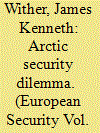

|
|
|
|
|
| Summary/Abstract |
After the Cold War, international relations in the Arctic were characterised by cooperation and diplomacy. However, since Russia's annexation of Crimea in 2014, largely peaceful relations in the High North have been endangered by growing military competition between Russia and Western Arctic powers. The lack of military to military dialogue between Russia and the West has exacerbated the situation. Consequently, an Arctic security dilemma has arisen, which threatens stability and increases the danger of unintended armed conflict resulting from accidents or misunderstandings. Security dilemmas are as old as international politics. They occur when states feel threatened by the expanding military capabilities of their neighbours even if there is no deliberate hostile intent. This article will examine the developing Arctic security dilemma and the chances of its mitigation. Two recent developments provide potential grounds for optimism. The new United States’ administration has pledged to return America to global engagement and multilateralism. In 2021, the Russian Federation is scheduled to become chair of the Arctic Council and the Arctic Coastguard Forum, the main intergovernmental institutions in the region. These events provide an opportunity to rebuild greater trust and confidence in relations between Russia and its Arctic neighbours and alleviate dangerous tensions.
|
|
|
|
|
|
|
|
|
|
|
|
|
|
|
|
| 2 |
ID:
181640


|
|
|
|
|
| Summary/Abstract |
European Defence is in a new and formative phase in which the European Union’s long list of defence acronyms has steadily grown. One of the most noticeable new policy initiatives is the European Commission’s European Defence Fund (EDF). This article consequently investigates and outlines the establishment of the European Defence Fund and the European Commission’s new role within the field of security and defence through the lens of revised neofunctionalism. This article thus asks how and through what steps did the EDF come about; and secondly how can neofunctionalism explain the dynamics involved in the establishment of the European Defence Fund. The analysis uses a process-tracing method and draws on interviews with relevant policymakers and officials in Brussels as well as official EU documents. The conclusions argue that the ever-increasing involvement of the European Commission in a policy field close to national sovereignty is starting to blur the traditional dichotomy between intergovernmental and supranational decision-making. In this way, this study contributes to the growing literature on the weakening of intergovernmentalism within the EU security and defence policy field.
|
|
|
|
|
|
|
|
|
|
|
|
|
|
|
|
| 3 |
ID:
181642
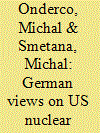

|
|
|
|
|
| Summary/Abstract |
Stationing of US nuclear weapons in Europe is a pillar of NATO deterrence. Despite their growing contestation, scholarly research on contemporary attitudes of both voters and political elites to the continued stationing of these weapons on their soil is lacking. We conducted original surveys of 2020 Germans and of 101 Bundestag members. Our results show scepticism about the military utility of US nuclear weapons in Germany, and aversion towards their use. At the same time, the results show a sizable support among both politicians and citizens for their removal from German territory as part of new nuclear arms control initiatives.
|
|
|
|
|
|
|
|
|
|
|
|
|
|
|
|
| 4 |
ID:
181641
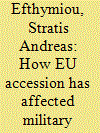

|
|
|
|
|
| Summary/Abstract |
This article explores how the concept of military service develops in the post-conflict society of Cyprus (RoC), following its accession to the European Union (EU). It is based on an exhaustive series of individual interviews with soldiers, lawyers, politicians, ambassadors and civilians, as well as an analysis of media content. The article sets out exactly how EU accession presented a confusing ideological trajectory for the army, lowering motivation for defending the border against occupying forces. The diminishing value of military service takes place against a background of changing masculine ideals. Moreover, defence diplomacy aiming to create energy alliances between EU member states against Turkey had the unintended consequence of young men further disassociating from direct involvement in the defence project. The article also analyses a number of policies developed to deal with conscription issues. Through the case study of Cyprus, we come to see how policy on military service during the EU accession process should incorporate changing civil-military relations.
|
|
|
|
|
|
|
|
|
|
|
|
|
|
|
|
| 5 |
ID:
181639
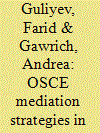

|
|
|
|
|
| Summary/Abstract |
Even though the Organization for Security and Cooperation in Europe (OSCE) has performed mediation efforts in Eurasian secessionist conflicts, its role has been neglected by mainstream international relations (IR) and conflict mediation literature. To fill in this gap, this article examines OSCE mediation strategies in two major secessionist conflicts: the Nagorno-Karabakh (NK) conflict between Armenia and Azerbaijan and the conflict in Eastern Ukraine. Drawing on Zartman’s conceptual framework, this study posits that OSCE mediation strategies were constrained given its weak organisational capacity, lack of legal empowerment and adverse geopolitical environment. Due to these structural limitations, the OSCE can be said to have been more effective in containing conflict than contributing to conflict resolution. This article aims to contribute to conflict mediation research by highlighting the importance of context for understanding the role of international organisations (IOs) as mediators.
|
|
|
|
|
|
|
|
|
|
|
|
|
|
|
|
| 6 |
ID:
181637
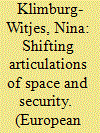

|
|
|
|
|
| Summary/Abstract |
European space policy is currently at a watershed. In 2021, there will be two institutions responsible for European space activities: The EU Space Agency (EU SPA) and the civilian European Space Agency (ESA) founded in 1975. This article investigates how new objectives and governance scheme(s) of European space activities reflect the increasing securitisation of space in Europe. Linking work in critical security studies to the concept of boundary work from science and technology studies (STS) I outline three phases of boundary work – expansion, expulsion and protection of autonomy – that all show how the dividing lines between peaceful and militarised space activities have become increasingly blurred. The conclusion argues that we currently witness a shift in the visions of European integration in space, with ESA remaining outside the EU framework and open to non-EU members while the EU SPA is accessible to EU members only and explicitly dedicated to the use of space for security. As the strategic potential of outer space is likely to grow, the paper offers a critical empirical investigation of the ongoing transformation in European space policy that has significant consequences for how we envision a “united Europe in space”.
|
|
|
|
|
|
|
|
|
|
|
|
|
|
|
|
| 7 |
ID:
181636
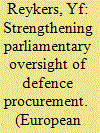

|
|
|
|
|
| Summary/Abstract |
This paper asks: to what extent can a dedicated or special committee with access to classified information empower parliaments to oversee major defence procurement decisions? These decisions often involve a mixture of political, military, economic and societal interests. Particularly after episodes of contestation or controversy, questions tend to arise about how to empower parliaments. The central argument in this paper is that being institutionally empowered and incentivised does not guarantee rigorous oversight. The availability of expertise is an oft-ignored factor in studies of parliamentary oversight. An analysis of oversight behaviour by the Belgian Federal Parliament during the acquisition of new fighter jets (2015–2018) shows that members of parliament also need to be capable of mobilising the necessary expertise in order to translate technical information in such a way that it allows them to influence decision-making, which is often executive-dominated. In this way, this paper contributes to managing expectations about the capacity of parliaments to cope with complex military problems.
|
|
|
|
|
|
|
|
|
|
|
|
|
|
|
|
| 8 |
ID:
181638


|
|
|
|
|
| Summary/Abstract |
The large number of asylum seekers dying off the coast of Libya has turned the Southern Mediterranean Sea into a new humanitarian space, prompting 11 non-governmental organisations (NGOs) to launch maritime Search and Rescue (SAR) operations between 2014 and 2017. These NGOs engaged in a complex web of interactions, ranging from rare instances of hostility, competition and mistrust to coordination, cooperation and integration. Drawing on role theory, I argue that organisational role conceptions are key to shaping NGO–NGO interactions. The humanitarian principles of neutrality, impartiality and independence serve as action scripts that inform NGOs’ role in the humanitarian space. Sea rescue NGOs have upheld different interpretations of humanitarian principles, developing supportive, neutral, or confrontational approaches vis-à-vis European governments’ border control policies. By leveraging content analysis and semi-structured interviews, I show that organisations with matching role conceptions have engaged in tighter forms of cooperation; charities with divergent role conceptions, by contrast, have shown a tendency to develop mistrust and engage in more competitive interactions. These frictions inhibited NGOs from forming a united front vis-à-vis policy restrictions and criminalisation, hindering the legitimacy and viability of non-governmental sea rescue.
|
|
|
|
|
|
|
|
|
|
|
|
|
|
|
|
|
|
|
|
|